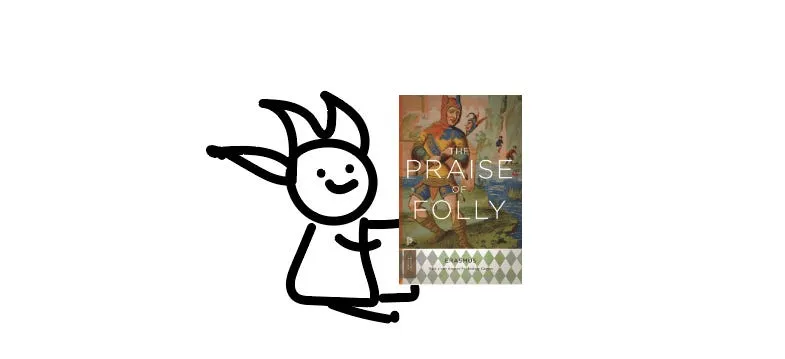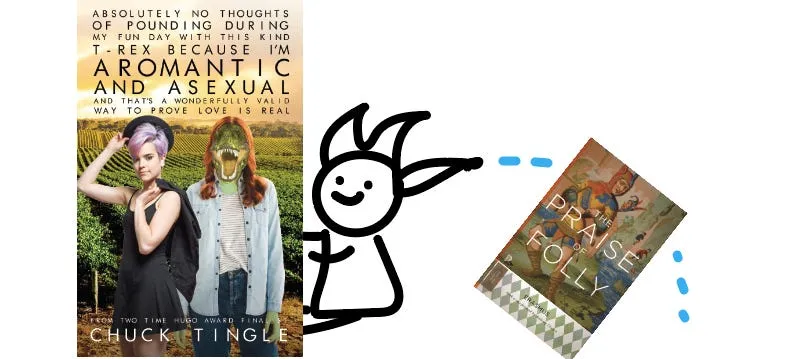In Praise of Folly
There’s a certain folly in having abject disappointment when a book fails to live up to the expectations its title inspires. And that book is Desiderius Erasmus’s “In Praise of Folly” (1509):

A famed satirical work of the Renaissance, it is a personification of Folly as she recites a rather long-winded oration of herself. She declares herself better (and more powerful) than the rest of the pantheon for she offers the gift of foolishness. It is the panacea that makes short human lives endurable.:
But I dare them now to confess what one stage of life is not melancholy, dull, tiresome, tedious, and uneasy, unless we spice it with pleasure, that hautgoust of Folly.
I have no shame in admitting that I only listened to half of the essay. The whimsy is enjoyable at first, yes, but it slowly totters into constant eye-rolling from the audience. And soon that constant eye-rolling turned into utter apathy as chapters descended into the inherent foolishness of the female sex and an attack on the Roman Catholic Church. If you are still curious, then at least listen to the audiobook, but I warn you that I feel no more educated than I was before.

However, the title was stuck in my head—In Praise of Folly. I thought about some of the previous projects I made on a blog that are absolutely foolish. Folly would enjoy these offerings upon her altar. For example, as a Sex and the City fanatic, I made it so that any error in Rstudio would give you the infamous sticky note or to the most recent one involving running to Taylor Swift’s All too Well (10 minute version). In truth, however, I did try to force myself to do serious projects for my serious portfolio, so I can show that I’m a serious job candidate in this wasteland of a job market.
With these serious projects, I found myself frustrated, especially as I was trying to learn Python. I was fraught with anxiety about stumbling and looking like a fool. Perhaps it’s my long experience in academia, where everyone is deathly afraid of being associated with Folly. If the capital you rely on to advance your career is your knowledge (or the appearance of it), then foolishness ultimately undermines your credibility. And here lies the paradox: what is learning but the practice of Folly?

Have you ever watched an infant learning to crawl? I observed my neighbor’s baby crawling for the first time. Except he was not crawling forward, mind you—he was somehow inching his way backwards. This is absolute folly! But this is how we learn! He hears my laughter and does not blush at being looked at as a fool! Should we not marvel at how quickly children learn? It is because they are beings of folly; they do not feel any embarrassment. They scribble haphazardly and find joy in learning how to draw. It does not matter if there is little finesse; they created something without any need of approval, but for the joy of creating something new. And perhaps that is why I reverted back to childlike silliness.
Someone shared a video of a similar approach:
Now that I have left academia, I have the extraordinary pleasure of practicing Folly more. To truly learn, I believe we must look to the children. We must not worry about scraped knees or the derision of those “wise men” who cannot see the point of such foolery. I had my experience of being called a fool many times by my superiors. Yet when you see the knowledge of these serious men and women, it is very common to see it very limited by their fear of looking foolish. In some sense, perhaps being a true scholar is to be a secret follower of Folly. To constantly learn is to seek making ourselves the fool over and over again.
Finally, that is my problem with the rise of AI. Everyone is no longer paying proper homage to Folly! Now it is easier to appear wise through imitation! But here is my declaration: People can imitate knowledge and wisdom, but no one can imitate Folly! Those silly side projects cannot be imitated in ChatGPT because they are ultimately unhinged, useless, and unsellable. Wise men want to work on useful things so that they can receive the external praise they crave. Go to LinkedIn, and you will see the same analysis of the same business data—uninspired praises back and forth for such derivative serious work. The disciples of Folly do not care for the praises because they know their projects are ultimately for Folly!

So do your silly little side projects! Be the disciples of Folly!